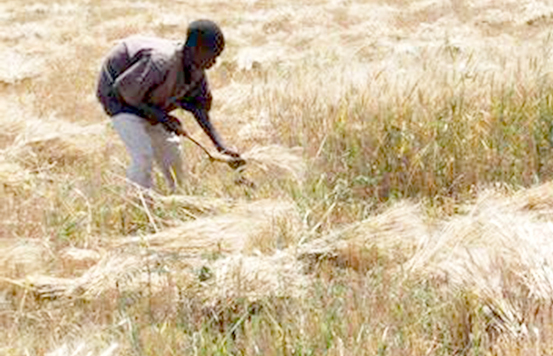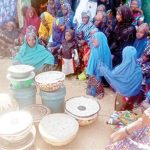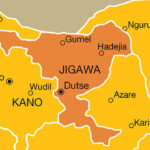Wheat farmers in Kano and Jigawa states are lamenting over low yield from the 2022/2023 farming season, which has seriously affected their profits and tampered with the prospect of the next season. They said the majority of them didn’t get up to 50 per cent of what they got in last year’s farming.
The farmers are also lamenting the skyrocketing cost of farm inputs, saying that during the planting period, a 50kg of wheat seed was sold as high as N80,000, which posed a great challenge. They further said that some of them could not even recover what they invested in their farms. They, however, said they hoped to recover and make profit.
A wheat farmer from Karfi town of Kura Local Government Area in Kano State, Bello Muhammad said, “In our village, only four of us out of over 1,000 farmers got more than 100 sacks of wheat this season. This is unlike before when we used to have 900 people getting over 120 sacks in three to four hectares of farmland. Some people ended up with 10 to 20 sacks in a place where they were supposed to get over 100.”
Another farmer from Hadejia Local Government Area of Jigawa State, Usaini Umar, said majority of farmers in Chiromawa village and the entire axis of the wheat area ended up losing. Only few of them counted profit. Umar said he got 22 sacks in his farm last year, but this time around, he ended with only four.
- Bakare: Tinubu lacks integrity, I’ll never call him my President
- FULL TEXT: Buhari’s farewell message to Nigerians
“I struggle very hard to get inputs, especially this year that we didn’t get any subsidy. I planted wheat and followed all the processes but I ended up with four bags in one acre. With this, I doubt if one would continue with wheat farming. Not only that, wheat was sold at over N50,000 last year, but now, it is about N30,000. This is worrisome and will discourage many farmers,” he said.
According to a report by the National Bureau of Statistics (NBS) in 2021, 13 states produced wheat in Nigeria on a total of 11,820 of land, while the total yield per hectare was 3,126 and total production was 36,943,800 metric tonnes.
The report showed that Kano had the highest wheat production of 6,512,800kg on 2,326 hectares, followed by Jigawa State with 2.091 hectares and 5,845,800kg production.
Findings by Daily Trust on Sunday also revealed that this year’s wheat season witnessed a surge in terms of production and number of farmers. Some of the farmers said they abandoned tomato farming because of the cost of inputs and the 2023 general elections, which was predicted to affect the supply of tomato to the South. As such, majority of tomato farmers joined the wheat farming in anticipation of profit and good yield, as against tomato, which cannot be stored, no matter the yield.
Salisu Mai Dabino Dorawar Sallau, one of the largest tomato farmers in Kano said, “We have to divert from tomato to other crops this season. Our region, Gafan and Kadawa, is one of the largest tomato farming areas, if not the best in the whole of Africa. But this year, there was wheat. In a block of 15 hectares you will hardly see one hectare of tomato, the remaining are wheat.”
The Wheat Farmers Association of Nigeria (WFAN) also projected to cultivate over 350,000 hectares to produce not less than one million metric tonnes in the 2022/2023 farming season.
However, despite all the efforts and tremendous action from the farmers and other stakeholders in the wheat sector, the farmers are disappointed by the turnout of the yield.
Attributing some of the reasons for the low yield, the Jigawa State chapter chairman of the All Farmers Association of Nigeria (AFAN), Alhaji Idris Ya’u Mai Unguwa, gave three major reasons for the low harvest.
He said the seeds planted by many farmers were not of good quality, adding that during the peak period of farming when the crop was in need of water, scarcity of naira started and worsened the situation of everything in the country. This is in addition to global climate change, which affected growth, and subsequently, output.
“This time around, farmers didn’t use improved seeds because it was costly. Also, during the peak time of farming when the crop was in need of water, farmers didn’t get cash to buy fuel for watering as a result of the naira redesign policy. The third reason is change in weather, which seriously affected the production of wheat this season.
“Averagely, in a hectare of wheat, one expected to get 35 to 40 sacks, but people ended up with 8 to 10 sacks in many farms. In my 10 hectares, I got only 180 sacks, while I was supposed to get up to 400,” he said.
Also speaking, a scientist and expert on wheat, Salihu Alkali, attributed the situation to global warming. He said the new seed variety lacked the capability to resist heat.
He also said many farmers abandoned the actual planting time for wheat, thinking that it would not affect their yield, but it contributed significantly to the current challenge.
“The planting period for wheat is very important and has to be taken into consideration. December 1 is the preferable time, but majority of the farmers planted at the end of December, and some even in January. This also affected yield because wheat doesn’t tolerate such changes.
“Unfortunately, the farmers didn’t understand the effect of this era of global warming as a result of climate change, which has become a topic of discussion in the farming sector. Some don’t even know that it exists.
“And the seeds we are using are not resistant to our climate condition, especially the fact that it is changing, season by season. Farmers went and used old seeds. Even those that used the Mexican imported seeds didn’t get what they expected because they didn’t follow our climate condition. One degree rise in temperature will lead to 4 per cent loss on your wheat yield,” he said.
Alkali further said farmers were not complying with the modern techniques of farming, adding that they applied the processes of rice farming on wheat, which is not the same; hence, will never give the desired results. He also questioned their process of fertiliser application and irrigation schedule, saying some only watered their wheat once or twice in a week.
Proffering solution, Alkali said there had to be a long term plan for wheat farming in Nigeria for the sector and its stakeholders to progress. He said part of the measures was for the government to increase the irrigation area from 100,000 hectares to 1 million. This, according to him, will boost production in the country and upgrade small scale farmers. He said one hectare of wheat would not give the desired results.
He also said the country, through the Lake Chad River Basin, should produce seeds that would be resistant to the climate condition in the country.
“The improved seeds, which were imported from Mexico, are not esistant to Nigerian conditions,” he explained.
He said subsidising farm inputs in the country would help wheat farmers, boost production and create room for price control.
Alkali further said the recent fall in the price of wheat in Nigeria was attributed to the Green Corridor agreement that allowed importation, adding that the imported wheat is cheaper than the indigenous produce, which is a threat to farmers.
“As a result of the Russia-Ukraine war, there was scarcity and a rise in the price of wheat. That was why it went high last year. But this time around, an agreement was signed, where wheat was imported into the country. This is to the extent that the imported one is of more quality and cheaper than the one we have. Recently, it was sold at N30,000, although the inputs were purchased at a high rate. So, producing seeds every three years in the country and subsidising farm inputs will support the sector and improve our production. It will also help significantly in sufficiency,” he said.
He urged farmers to always abide by the guidelines on wheat farming, especially in the areas of planting, watering, fertiliser application and intense monitoring.

 Join Daily Trust WhatsApp Community For Quick Access To News and Happenings Around You.
Join Daily Trust WhatsApp Community For Quick Access To News and Happenings Around You.


